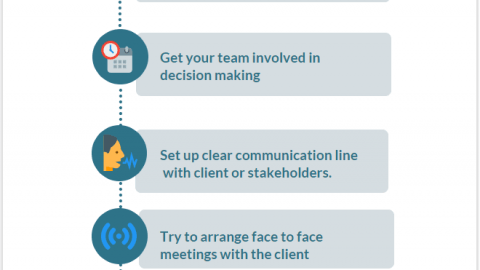Why Do Some Projects Fail? – Reasons for Project Failure
So many projects fail due to a list of common reasons. For example, around 60% of IT projects fail according to an IBM study. More or less, the same goes for other industries. Most of the projects didn’t meet the deadlines, lost money, or produced low-quality products up to now. It is important to ask why projects fail to understand what reasons contributed to the project failure. In this way, we can avoid making the same mistakes in our future projects. It is the cheapest way for us to learn from other people’s mistakes rather than our own. In this article, we will share with you real-life examples to help you to understand the causes of project failure.
Table of Contents
Before to start, let me narrate one of my friend’s mistakes that contributed to his project’s failure.
Five years ago, when he first became a project manager, he made a couple of mistakes such as incorrect cost estimations, forgetting to procure the materials on time, and mismanaging relationships with the client. As a result, he completed his project on time but he was obliged to spend his days and nights correcting the mistakes. He was lucky because he completed his project on time without overspending too much but what about the other project managers?
Ok, let’s go ahead and specify common reasons why projects fail.
Common Causes of Project Failure
So what are the reasons for project failure? Let’s answer this question by analyzing the common causes of project failure.
1. Poor Communication
Poor communication is a major factor that contributes to project failure. If things are not going as planned or there is a mistake, team members should come together and decide the actions to be taken.
Whether it’s between top management, or with the project team, it’s terrible to have poor communication.
2. Poor Preparation
Poor preparation is one of the most important reasons for project failure. Before starting a project, you need to focus on the big picture and think about what you are going to do as much as possible. Otherwise, you will find yourself and your project team in big trouble when the project starts. You need to comprehend what the end product looks like at the beginning.
Assembling a meeting with the key project stakeholders will help you to understand their expectations regarding the quality of the end product. This will provide you an insight regarding where to start.
3. Poor Document Control
If you want to understand resasons why do projects fail, you should take a look at key project documents. Document control ensures important project data is protected and indexed. This helps to reduce errors and mistakes during the life cycle of the project. A well-established document control system allows the project team to access past records quickly when needed. Note that historical data is often used for dispute resolution between the parties.
4. Bad Leadership
On the other hand, lack of transparency in project management, authority, listening skills, and faith are the signs of bad leadership.
5. Lack of Experience
Main responsibility of a project manager is to guide the team members towards the success of the project. Inexperienced project managers may not be capable of guiding project team members regarding project tasks. They can mislead stakeholders related to the real status of the project.
Additionally, a project manager is responsible for assigning team members to roles who have matching experience.
6. Wrong Estimations
Wrong estimations often lead to wrong decisions. While preparing a project schedule, if your estimates regarding the duration of activities are wrong, your resource planning will also be wrong. The same goes for cost estimations. If you don’t estimate the project costs correctly, you can not make the right commitment of dollars to an activity.
7. Inadequate Performance Measurement and Tracking
It is essential to discuss the importance of performance measurement to understand why do projects fail. Performance measurement is an important aspect of project management. A well-established performance measurement system provides you enough information regarding the health of the project. On the other hand, an inadequate tracking system does more harm than good. Incomplete reports often mislead the project team to wrong decisions.
Recommended Article: Work Performance Reports
8. Lack of Direction & Unclear Goals
Nobody wants to begin a trip without a roadmap. The same logic applies when you’re managing a project. Clearly defining project requirements, establishing clear deadlines and roles are vital for any project’s success. Thus, each project team member will be aware of his/her responsibilities and reporting lines.
9. Paying Less Attention to the Warning Signs
Before the failure of a project, there will have always been early warning signs. If you take action when you received the warning signs, you may have the chance to save the project. There are lots of things to be done to stop the failure and recover the project. Reviewing the direction, going through the goals, improving collaboration and communication between the project team are some of them.
10. Inadequate Risk Management
Poor risk management has the ability to impact your project objectives. It has the potential to affect the project schedule and budget. Unforeseen risks may slow down the project performance.
Use Lessons Learned Reports to Prevent Common Causes of Project Failure
In addition to the above, poorly defined scope statements, incorrect assumptions, inexperienced staff, and cultural differences are examples of common causes of project failure. Some of them can be eliminated by using the lessons learned reports effectively. Because lessons learned reports involve invaluable information related past projects achievements and errors. By revieving lessons learned, you can easily understand what type of issues did the project team meet and what were the solutions.
So, Why Do Projects Fail?
Many projects produce disappointing outcomes on completion. There are lots of reasons for project failure. Some of them are well-known reasons for all types of projects but some of them are specific to the project. Sometimes it is possible to control these causes of project failure, but sometimes failure can be uncontrollable. In this article, we discussed the reasons why projects fail.
What is the main reason of project failure for you? Share your experiences with us by using the comments section.

Keith Brandon is a senior director of Keboth Training and Education Co. In addition to leading Keboth’s global team, he developed Keboth’s online training system that offers advanced learning solutions for professionals.











Stating the goal clearly, good communication with team members and being able to make a plan and sticking to it are the key factors for a project to be successful.
everyone can make mistakes but if you get lesson from your mistakes absolutely you will be in higher position.
Hi 🙂 thank you for this post the main failure is inadequate documentation and tracking, and communication at every level of management because if communication is not correct whether from the manager side or team member the project will fail with clear understanding. Very useful information I will bookmark for future reference.
Bad leadership is often the problem indeed. Here are some other common issues: https://kanbantool.com/blog/why-are-your-project-managers-efforts-failing